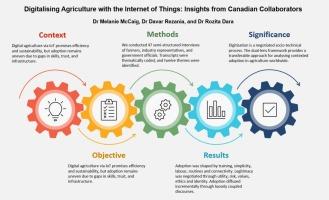Digitalising agriculture with the internet of things: Insights from Canadian collaborators
IF 6.1
1区 农林科学
Q1 AGRICULTURE, MULTIDISCIPLINARY
引用次数: 0
Abstract
CONTEXT
The digitalisation of agriculture through Internet of Things (IoT) technologies is promoted as a driver of efficiency and sustainability, yet adoption remains uneven, particularly where farmers face barriers of skills, trust, and infrastructure.
OBJECTIVE
This study explores how Canadian farmers, industry representatives, and government officials construct discourses around IoT adoption, and how these shape opportunities, constraints, and legitimacy.
METHODS
We conducted 47 semi-structured interviews with farmers, industry actors, and government officials. Thematic analysis identified 12 themes, organised along two continua: individual versus structural opportunities and rational versus cultural elements. The analysis was guided by a dual lens framework of opportunity structures and loose coupling.
RESULTS AND CONCLUSIONS
Adoption depended on both individual capacities (training, simplicity, digital literacy) and structural conditions (labour, routines, connectivity). Legitimacy was negotiated through rational evaluations of utility and risk and cultural considerations such as values, ethics, and identity. Adoption unfolded through loosely coupled discourses, producing incremental and uneven rather than uniform diffusion.
SIGNIFICANCE
The study advances debates on agricultural digitalisation by showing how adoption is experienced through everyday practices, negotiated legitimacy, and loosely coupled diffusion. Beyond Canada, the framework offers a transferable lens for analysing contested adoption in agriculture and other socio-technical systems.

数字化农业与物联网:来自加拿大合作者的见解
通过物联网技术实现农业数字化被视为效率和可持续性的驱动力,但采用情况仍然不均衡,特别是在农民面临技能、信任和基础设施障碍的情况下。本研究探讨了加拿大农民、行业代表和政府官员如何围绕物联网采用构建话语,以及这些话语如何塑造机会、限制和合法性。方法对农民、行业参与者和政府官员进行了47次半结构化访谈。主题分析确定了12个主题,沿两个连续体组织:个体与结构机会和理性与文化元素。分析以机会结构和松耦合的双透镜框架为指导。结果与结论:智能手机的采用取决于个人能力(培训、简单性、数字素养)和结构条件(劳动力、日常工作、连通性)。合法性是通过对效用、风险和文化因素(如价值观、伦理和身份)的理性评估来协商的。采用通过松散耦合的话语展开,产生增量和不均匀的传播,而不是均匀的传播。该研究通过展示如何通过日常实践、协商合法性和松散耦合扩散来体验农业数字化,从而推进了关于农业数字化的辩论。在加拿大之外,该框架为分析农业和其他社会技术系统中有争议的采用提供了一个可转移的视角。
本文章由计算机程序翻译,如有差异,请以英文原文为准。
求助全文
约1分钟内获得全文
求助全文
来源期刊

Agricultural Systems
农林科学-农业综合
CiteScore
13.30
自引率
7.60%
发文量
174
审稿时长
30 days
期刊介绍:
Agricultural Systems is an international journal that deals with interactions - among the components of agricultural systems, among hierarchical levels of agricultural systems, between agricultural and other land use systems, and between agricultural systems and their natural, social and economic environments.
The scope includes the development and application of systems analysis methodologies in the following areas:
Systems approaches in the sustainable intensification of agriculture; pathways for sustainable intensification; crop-livestock integration; farm-level resource allocation; quantification of benefits and trade-offs at farm to landscape levels; integrative, participatory and dynamic modelling approaches for qualitative and quantitative assessments of agricultural systems and decision making;
The interactions between agricultural and non-agricultural landscapes; the multiple services of agricultural systems; food security and the environment;
Global change and adaptation science; transformational adaptations as driven by changes in climate, policy, values and attitudes influencing the design of farming systems;
Development and application of farming systems design tools and methods for impact, scenario and case study analysis; managing the complexities of dynamic agricultural systems; innovation systems and multi stakeholder arrangements that support or promote change and (or) inform policy decisions.
 求助内容:
求助内容: 应助结果提醒方式:
应助结果提醒方式:


